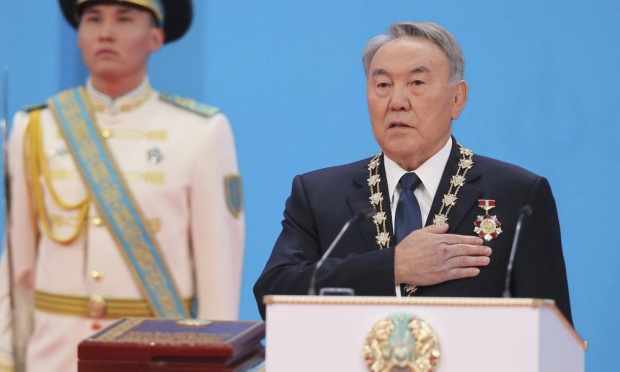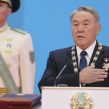
Kazakhstan’s Presidential Election and the Challenges Ahead (Part One)
Publication: Eurasia Daily Monitor Volume: 12 Issue: 87
By:

On April 26, 2015, Kazakhstan held its fifth presidential election in a quarter-century of independent statehood (see EDM, April 30). Incumbent President Nursultan Nazarbayev was re-elected overwhelmingly for another five-year term, as pre-election opinion polls and Nazarbayev’s popularity ratings with Kazakhstan’s voters had foreshadowed. His term of office was to have expired in 2016. However, the president and the governing elite decided to hold a pre-term election. This has renewed and bolstered Nazarbayev’s popular mandate to handle the urgent challenges confronting Kazakhstan.
Kazakhstan’s leadership discusses these issues openly with its population and its international partners. Nazarbayev catalogued them again in the speech inaugurating his new term of office (Kazinform, April 28).
The most serious challenges (some of them unaccustomed) include an economic slowdown, low oil prices, unpredictable turns in Russia’s policies under President Vladimir Putin, trade and currency disputes within the recently launched Eurasian Economic Union, perceived strategic aloofness of the United States from Central Asia, vigilance toward potential inroads of violent jihadism in the region, and the transition of power that Nazarbayev, who turns 75 this year, is expected to steer during this term of office.
The quality and results of elections (as of all political processes) in Kazakhstan cannot be assessed by Western European or US “benchmarks.” Such terms of comparison would result in underestimating Kazakhstan’s political reform efforts. Those efforts can only be assessed properly in relation to Kazakhstan’s historical legacies, existing level of societal development, and the comparatively low base and late start of its political modernization. The concepts of evolution, organic development, deference to authority, and the politics of national consensus define Kazakhstan’s political modernization, its scope and its pace.
Kazakhstan’s political reforms, as in other successfully reforming non-Western countries, are necessarily elite-driven from above, under a recognized national leader. The development of representative political institutions follows a process of evolution, correlated with the spread of education and civic responsibility among voters and political parties. Kazakhstan’s elective institutions are developing organically with the state itself, rather than as a counterweight to executive power, at this stage. The country’s political culture is based on deference toward the constituted authority. Personalized by Nazarbayev, a national consensus has developed based on his performance in office, economic growth, and the confidence he generates in the continuing stability and modernization of Kazakhstan amid growing international disorders. Ultimately, however, the consensus is premised on the expectation of prosperity, and thus it is not unconditional.
Voter turnout was a record-high 95 percent in this election. Nazarbayev garnered 98 percent of the votes cast (Kazinform, April 27, 28). Election observers fanning throughout the country did not report any material evidence of fraud, let alone of the outcome-altering type. While such high percentages always incorporate some measure of passive, rather than active support, they clearly reflect the choice of Kazakhstan’s voters: yearnings to maintain the economic growth, security and stability associated with the Nazarbayev era, and their preference to retain the institution of a strong presidency in the post-election period.
The also-rans in this election were Turgun Sydzykov, Secretary of the Central Committee of Kazakhstan’s Communist People’s Party (rival to the Moscow-oriented Communist Party of Kazakhstan) and Abylgazy Kusainov, head of Kazakhstan’s Trade Union Federation (but self-nominated as a presidential candidate). Each is 67 years of age. They received a combined 2 percent of the total votes cast.
Sydzykov seemed to run as a decoy candidate on a platform against “decadent” Western social and cultural influences. If his 1 percent score adequately gauges that type of sentiment in Kazakhstan (among either Kazakhs or local Russians), then that score is reassuring to the country. Kusainov ran on a politically neutral platform of ecological awareness and education. This concern features regularly in Kazakhstan’s parliamentary and presidential elections as the country overcomes the consequences of Soviet-era ecological disasters.
Twenty-four other, self-nominated aspirants sought registration as presidential candidates. They failed to meet various requirements for registration, mainly fluency in the Kazakh language. Fifteen of them failed the Kazakh-language test or declined to take that test. Of Kazakhstan’s nine registered political parties, only the governing Nur Otan and the Communist People’s Party (see above) supported presidential candidates in this election (Kazakhstan’s Central Electoral Commission press release, April 25).
Nazarbayev did not need to conduct a political campaign for his re-election. He had delivered on March 11 his last public speech prior to the April 26 election. The two other candidates did conduct political campaigns, with media publicity and state funding guaranteed under the law. For his part, Nazarbayev generated far more publicity by dint of his presidential activities and the incumbency advantage.
Voters’ expectations are high from the re-elected President Nazarbayev. He is expected to ensure, as before, the country’s sovereignty and territorial integrity, resumption of economic growth powered by international investment, equitable allocation of the national income, an accelerated modernization of infrastructure throughout the vast country, and the transition to younger generations of the political, administrative, and managerial elites in the state and private sectors. Those expectations are likely to be transferred in due course to the next leadership, be it personalized (difficult to emulate after Nazarbayev) or be it a more collegial one.




